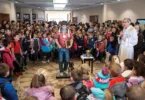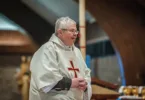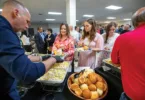
Delegates from all over the United States pray during the opening Mass July 1 at the “Convocation of Catholic Leaders: The Joy of the Gospel in America” in Orlando, Florida. The archdiocese sent 22 delegates to the historic gathering. CNS PHOTO/BOB ROLLER
by Joe Bollig
joe.bollig@theleaven.org
KANSAS CITY, Kan. — It was 10 years in the making.
And Archbishop Joseph F. Naumann was in on the ground floor.
From July 1-4, an archdiocesan delegation of 22 people — including Archbishop Naumann — joined 3,500 other Catholic clergy, religious and laity for this historic event in Orlando, Florida.
Called the “Convocation of Catholic Leaders: The Joy of the Gospel in America,” the unprecedented gathering met to discuss and then set forth the future focus and direction of the church in the United States.
The challenge sent out from the convocation is for every individual Catholic and, if accepted, will change the church in our country in profound ways.
“I was privileged to be part of the working group that planned the convocation of Catholic leaders,” said Archbishop Naumann. “In addition to being the chairman for the United States Conference of Catholic Bishops Committee on Pro-Life Activities, I had the privilege to help represent the pro-life committee in the planning of the convocation.”
It’s no accident that half of the convocation’s title comes from Pope Francis’ Nov. 24, 2013, apostolic exhortation “The Joy of the Gospel.”
And that other half — “in America” — refers to making its vision transform life in our homes and parishes.
Research conducted before the convocation revealed an urgent need to evangelize many people already in the pews, said Archbishop Naumann. Many parishioners could not describe their own relationship or encounter with Jesus — and this, according to our current and two previous popes — is the foundation of our Catholic faith.
“We received the results of our research at the same time Pope Francis promulgated the ‘The Joy of the Gospel,’ in which our Holy Father challenged every Catholic to be a missionary disciple,” said Archbishop Naumann.
Pope Francis’ vision in “The Joy of the Gospel” inspired the bishops planning the convocation in more ways than one. His message would become the theme and focus of the historic gathering. There, church leaders would reflect on this vision and then map out a strategy for implementing the new evangelization and the formation of missionary disciples here in the American church.
And who will be these missionary disciples?
We will.
Preparation and inspiration
The archdiocesan delegation was handpicked by Archbishop Naumann, and the delegation included seven priests, two deacons, two religious and 10 laypersons.
Eight others from the archdiocese attended in a different capacity, some as presenters and others as representatives of independent ministries or institutions.
To prepare for the convocation, delegates read “The Joy of the Gospel,” attended a meeting at Savior Pastoral Center in May, and participated in two USCCB webinars.
Most of the action at the four-day event took place on July 2 through July 4. The days included prayer or a eucharistic procession and Benediction, plenary sessions attended by all convocation goers, and smaller breakout sessions that featured panel discussions.
“Each day, we had beautiful and inspiring celebrations of the Eucharist,” said Archbishop Naumann. “The first night we had a communal, multilingual praying of the rosary and Marian devotion, entrusting the work of the convocation to the intercession of Mary, our mother.
“The second night,” he continued, “we had communal prayer, acknowledging the sins of our Catholic community and praying for forgiveness and healing.
“The final night . . . was a time of prayer of praise and thanksgiving, and calling down the Holy Spirit to empower us in our mission.”
Listening and learning
Delegate Debbie Nearmyer has gone to many church-sponsored meetings and conferences in her time in ministry.
This one, she said, was different.
“We usually show up and listen to experts who tell you what they know and how to do what they know,” said Nearmyer, director of faith formation at St. James Academy in Lenexa.
“To be a delegate standing next to bishops and cardinals, members of the USCCB, and Sisters and Brothers on an even playing field — it was like being at a family event,” she added.
During some breakout sessions, the panel took questions texted into them. In others, the technique was open microphone.
“I think the key word in this is listening,” said Nearmyer. “Those on stage were sharing what they knew, but were also asking questions [of the delegates].”
“There was a lot of dialogue and listening to each other,” she continued. “We were accompanying one another into this dialogue, prayer and relationship and [were sent out] to our own parishes and places of ministry. We walked into this together and then were sent forth to walk with others.”
The discussions sparked assessments of where the church in America was, relative to Pope Francis’ vision.
“To me, it felt like we were holding listening sessions on different needs and concerns of the church — taking a ‘gut check’ on specific realities — and figuring out where we were in the light of Pope Francis’ [‘The] Joy of the Gospel,’” said Zena Weist, vice president of marketing and media relations at Catholic Charities of Northeast Kansas.
Topics and takeaways
The convocation format was divided into three broad areas, said Archbishop Naumann.
The first was an examination of the “landscape” or culture in which the church is called to implement the new evangelization. Some features of this landscape are the rise of the “nones” or individuals with no formal religious affiliation, the deterioration of family life, the sex abuse crisis, increasing secularization and the growing diversity in both society and the church.
The second broad area focused on how the church can move its mission forward in the context of the culture.
The third broad area was the development of action plans — how the church can form and equip missionary disciples. These are the evangelists who will go the peripheries to share the joy of the Gospel.
“Evangelism today is knowing and loving Christ through his church and the sacraments, and sharing that with other people,” said delegate Emily Lopez, lead consultant for adult evangelization for the archdiocese.
“Evangelization is going out — but not necessarily in a geographical sense,” Lopez continued. “The idea is going out boldly into those areas of conversation that people are afraid to have. Or stepping out of a comfort zone and delving [into] the beauty and messiness of someone’s life to invite them to know Christ and his church the way we know [them].
“It’s truly loving people and sharing Christ’s love with them in an intentional way.”
The term “missionary disciple” is one that many Catholics may not be familiar with, but has been a major part of the church from the beginning.
“A disciple is a follower of Christ, someone who knows and loves Christ,” said Lopez. “[To be a] missionary means sharing that love with others. . . . To truly love Christ and love others means introducing the two to each other.”
“All Catholics are automatically sanctioned for this work through their baptism,” she continued. “We are all called into a relationship with Christ at our baptism, which makes us children of God.”
“We have to stop looking to other people and things to be the solution,” added Lopez. “We have to be the solution.”
The vision of Pope Francis is that missionary disciples go out to the peripheries.
“The challenge to go out to the peripheries is an age-old one,” said delegate Father Gary Pennings, archdiocesan vicar general. “The result of original sin is that we tend to turn in on ourselves and sometimes avoid reaching out to others, especially others who are different than us.”
“The Holy Father invites all the faithful to a personal accompaniment that is patient, and that takes time,” he continued.
“I don’t think the pope is simply asking us to venture to the peripheries,” he said, “but he wants us to accompany people when we are there.
“He doesn’t simply want us to help those on the peripheries, but he wants us to get to know them and befriend them.
“Genuine accompaniment is always meant to lead others closer to Christ.”
Father Mitchel Zimmerman, who was on the breakout session panel discussing the cultural landscape of colleges and universities, left with three big takeaways.
The first is the importance of listening. There are a lot of people who feel that the church hasn’t listened to them.
The second is the breakdown of the family. The church is the antidote because it is a family that gives each person dignity, hope and a wealth of relationships.
The third is that we are all evangelizers. It will take an army of Catholics to reach the lost and alienated of society.
“The big question for every Catholic is: ‘Are you on mission?’” said Father Zimmerman, director and chaplain at the St. Lawrence Catholic Campus Center at the University of Kansas in Lawrence. “If you’re ‘on mission,’ what’s your mission field and what is your witness?”
A tale of two visions
Even as the U.S. bishops were preparing for the convocation, Archbishop Naumann and his visioning team here in the archdiocese were developing the archdiocese’s 10-year mutually shared vision with its three key initiatives.
“The convocation really matched well our own archdiocesan vision,” said Archbishop Naumann.
The first key initiative is to build a culture of evangelization.
“At the heart of evangelization is the sharing of one’s own encounter with Jesus Christ and the invitation to others to seek such an encounter,” said Father Pennings. “So, one of the pope’s main hopes in [‘The Joy of the Gospel’] is being addressed.”
The second key initiative is the strengthening of marriage and family life.
“There was much talk at the convocation about the challenges that families face,” said Father Pennings. “The second key initiative is right in line with what the pope is asking as he challenges us to become missionary disciples, because the family is a mission field.”
The third key initiative is cultivating relationships through the corporal and spiritual works of mercy. This is one way of answering the pope’s call to reach out to the peripheries, said Father Pennings.
What comes next?
The next step is the most challenging — but also the most exciting.
Archbishop Naumann will call the archdiocesan delegates together to strategize on how the archdiocese can put some of the key findings of the convocation into practice.
“I suspect the archbishop will publish some kind of summary or exhortation based on the national conversation that took place in Orlando,” said Father Pennings.
“I’m sure the archdiocesan Convocation of Parish Ministries, scheduled for Oct. 13, will focus on sharing with parish leaders some of the best practices identified at the convocation.”
The Orlando convocation was a success, said Archbishop Naumann. It brought Catholic leaders together to pray, learn and plan. They left spiritually and intellectually fed.
“I believe something magical happened in Orlando, and it had nothing to do with Disney World,” said the archbishop. “It was the movement of the Holy Spirit igniting and motivating the participants to live our Catholic faith with greater passion and zeal.
“The larger goal of the convocation was the hoped-for impact in the dioceses of the United States to jumpstart our local efforts to form missionary disciples to proclaim the joy of the Gospel.
“I’m excited about the possibilities as we begin to take what was experienced at the convocation and use it to advance the new evangelization in the Archdiocese of Kansas City in Kansas.”






